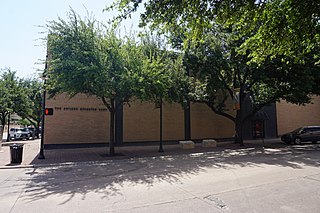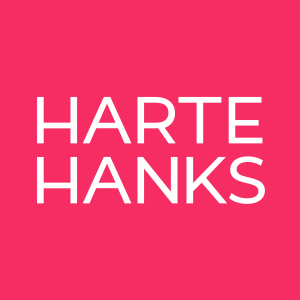Related Research Articles

Hearst Communications, Inc., often referred to simply as Hearst, is an American multinational mass media and business information conglomerate based in Hearst Tower in Midtown Manhattan in New York City.

The Dallas Morning News is a daily newspaper serving the Dallas–Fort Worth area of Texas, with an average print circulation in 2022 of 65,369. It was founded on October 1, 1885, by Alfred Horatio Belo as a satellite publication of the Galveston Daily News, of Galveston, Texas. Historically, and to the present day, it is the most prominent newspaper in Dallas.
Belo Corporation was a Dallas-based media company that owned 20 commercial broadcasting television stations and three regional 24-hour cable news television channels. The company was previously known as A. H. Belo Corporation after one of the early owners of the company, Alfred Horatio Belo, now the name of the newspaper company spun off from Belo early in 2008. Belo had its headquarters in the Belo Building in Downtown Dallas, designed by Dallas architects Omniplan and constructed between 1983 and 1985.

DallasNews Corporation, formerly A. H. Belo Corporation, is a Dallas-based media holding company of The Dallas Morning News and Belo + Company. The current corporation was formed when Belo Corporation separated its broadcasting and publishing operations into two corporations. A. H. Belo also owns a part interest in Classified Ventures. The CEO of the company is James Moroney III and the company had its headquarters in the Belo Building in Downtown Dallas. In 2016, the company announced that it is planning to leave the Belo Building for The Statler Library, also located downtown. As of 2018, the company website lists 1954 Commerce Street in Dallas as their headquarters address.

The Pulitzer Prizes for 1980 were announced on April 14, 1980. A total of 1,550 entries were submitted for prizes in 19 categories of journalism and the arts. Winners were chosen by the 16-member Pulitzer Prize Board, presided over by Clayton Kirkpatrick. For the first time in the Prizes' history, finalists were announced in addition to the winners.

The Dallas Times Herald, founded in 1888 by a merger of the Dallas Times and the Dallas Herald, was once one of two major daily newspapers serving the Dallas, Texas (USA) area. It won three Pulitzer Prizes, all for photography, and two George Polk Awards, for local and regional reporting. As an afternoon publication for most of its 102 years, its demise was hastened by the shift of newspaper reading habits to morning papers, the reliance on television for late-breaking news, as well as the loss of an antitrust lawsuit against crosstown rival The Dallas Morning News after the latter's parent company bought the rights to 26 United Press Syndicate features that previously had been running in the Times Herald.

The Houston Post was a newspaper that had its headquarters in Houston, Texas, United States. In 1995, the newspaper shut down, and its assets were purchased by the Houston Chronicle.

The Austin American-Statesman is the major daily newspaper for Austin, the capital city of the U.S. state of Texas. It is owned by Gannett.

The Daily News, formerly the Galveston County Daily News and Galveston Daily News, is a newspaper published in Galveston, Texas, United States. It was first published April 11, 1842, making it the oldest newspaper in the U.S. state of Texas. The newspaper founded The Dallas Morning News on October 1, 1885, as a sister publication. It currently serves as the newspaper of record for the City of Galveston as well as Galveston County.
The Timaru Herald is a daily provincial newspaper serving the Timaru, South Canterbury and North Otago districts of New Zealand. The current audited daily circulation is about 14,500 copies, with a readership of about 31,000 people. The paper is owned by media company Stuff Ltd.

Abilene Reporter-News is a daily newspaper based in Abilene, Texas, United States. The newspaper started publishing as the weekly Abilene Reporter, helmed by Charles Edwin Gilbert on June 17, 1881, just three months after Abilene was founded. It is hence the oldest continuous business in the city. It became a daily newspaper in 1885.

Harte Hanks is a global marketing services company headquartered in Boston, Massachusetts. Harte Hanks services include analytics, strategy, marketing technology, creative services, digital marketing, customer care, direct mail, logistics, and fulfillment.
The Dallas Times was an afternoon newspaper published in Dallas, Texas (USA) from 1876 until it merged with the Dallas Herald in 1888 to form the Daily Times Herald.

Alfred Horatio Belo was the founder of The Dallas Morning News newspaper in Dallas, Texas, along with business partner George Bannerman Dealey. The company A. H. Belo Corporation, owner of The Dallas Morning News, was named in his honor.
Today Newspapers were a chain of newspapers that served several suburban communities in southern Dallas County, Texas (USA), including Cedar Hill, DeSoto, Duncanville, and Lancaster as well as Grand Prairie.
The Sweetwater Reporter is a newspaper based in Sweetwater, Texas, covering the Nolan County area of West Texas. Owned by Horizon Publications Inc., it publishes an evening paper six days a week, Sunday through Friday.
A. C. Greene was an American writer – important in Texas literary matters as a memoirist, fiction writer, historian, poet, and influential book critic in Dallas. As a newspaper journalist, he had been a book critic and editor of the Editorial Page for the Dallas Times Herald when John F. Kennedy was assassinated, which galvanized his role at the paper to help untangle and lift a demoralized city in search of its soul. Leaving full-time journalism in 1968, Greene went on to become a prolific author of books, notably on Texas lore and history. His notoriety led to stints on radio and TV as a talk-show host. By the 1980s, his commentaries were being published by major media across the country. He had become a sought-after source for Texas history, anecdotes, cultural perspective, facts, humor, books, and politics. When the 1984 Republican National Convention was held in Dallas, Greene granted sixty-three interviews about Texas topics to major media journalists. Greene's 1990 book, Taking Heart – which examines the experiences of the first patient in a new heart transplant center (himself) – made The New York Times Editors Choice list.
Robert Lee Slaughter (1870-1938) was an American rancher and oilman. He was the owner of ranches in Texas, USA and Sonora, Mexico.

The Oakland Cemetery is a historic cemetery in Dallas, Texas, United States. It originally stood on 180 acres in rural Dallas County 1.5 miles southeast of the county court house when it opened in 1892. Economic problems, court judgements, land sales and acquisitions altered the cemetery to approximately 48 acres by 1969. About 27,000 people have selected Oakland Cemetery as the burial location for themselves and/or their family members. Burials include many prominent politicians, educators, physicians, ministers, business leaders, military service members, ancestors of famous individuals and ordinary citizens. The cemetery has a number of interesting memorials, sculptures and vaults. Mount Auburn pauper cemetery, owned by the city of Dallas, a Dallas county pauper cemetery, and Opportunity Park, a city of Dallas public park border Oakland Cemetery. A Confederate cemetery, cared for by the city of Dallas Parks Department, is nearby.
References
- The News and the Herald. Dallas Morning News, November 30, 1885, p. 1.
- The Herald's Valedictory. Dallas Morning News, November 30, 1885, p. 4.
- The Daily Herald. Dallas Morning News, January 14, 1886, p. 2.
- The Herald: It Passed Into the Hands of Speaker Foster Yesterday. Dallas Morning News, June 8, 1886, p. 8.
- Cox, Patrick. The First Texas News Barons, pp. 74–75. Austin: University of Texas Press, 2005. ISBN 0-292-70977-3.
- Rogers, John William. The Lusty Texans of Dallas, ch. XV. New York: Dutton, 1960.
- The WPA Dallas Guide and History. Denton: University of North Texas Press, 1992. ISBN 0-929398-31-9.